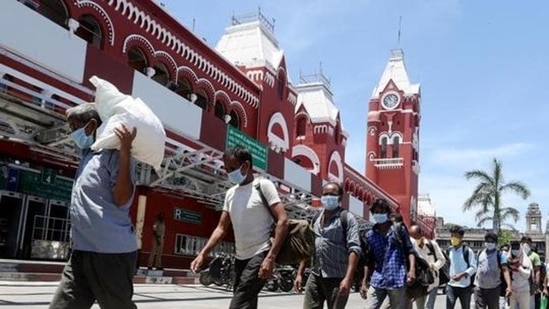Govt considers direct welfare transfer, job guarantee scheme for urban poor in Budget
New Delhi: Armed with a roughly 230-million strong Aadhaar-linked database of migrant labourers and gig workers, the government is considering an urban equivalent of its flagship rural job scheme and direct transfers related to various welfare programmes as part of its drive to help the urban poor and boost consumption, three people aware of the development said
New Delhi: Armed with a roughly 230-million strong Aadhaar-linked database of migrant labourers and gig workers, the government is considering an urban equivalent of its flagship rural job scheme and direct transfers related to various welfare programmes as part of its drive to help the urban poor and boost consumption, three people aware of the development said.

The initiatives may find a mention in the Budget on February 1, they added requesting anonymity. “An exhaustive databank at the e-Shram portal is ready for direct cash transfer to urban poor besides portability of schemes for migrant workers, one of the worst victims of the Covid lockdown in 2020,” one of the people said.
“The move will certainly score immense political dividends for the ruling BJP ahead of the Uttar Pradesh assembly polls as most of the sufferers of the 2020 exodus were migrant workers from UP and Bihar,” said Keshav Mishra, professor at the Faculty of Social Sciences, Banaras Hindu University (BHU).
According to government data, the country witnessed an exodus of over 10.46 million migrant labourers after a hard nationwide lockdown was imposed from March 25, 2020 that continued for little more than two months. Most of the workers belonged to UP (3,249,638) followed by Bihar (1,500,612) and West Bengal (1,384,693).
The government on August 26, 2021 launched the e-Shram portal for Aadhaar-linked registration of unorganised sector workers in urban areas. “For the first time in the History of India, a system is being made to register 38 crore [380 million] unorganised workers. It will not only register them but also be helpful in delivering of various social security schemes being implemented by the Central and state governments,” labour minister Bhupender Yadav said on the day of its launch.
HT on December 15, 2021 reported that the Union government was working on a range of social security and welfare schemes for the informal sector, particularly migrants and gig workers, covering basics such as food security, affordable accommodation, and medical benefits, higher order needs including skill upgradation, financial inclusion, and access to institutional credit, including cash transfers to registered beneficiaries. The urban unorganised sector also includes construction workers, street vendors and domestic workers.
“With e-Shram portal registrations and Area Frame Establishment Surveys under AQEES - All India Quarterly Establishment based Employment Survey, Union Government will evolve a strategy to deal with the urban workers and the poor. The Government is also mindful of the suggestions for an urban Mahatma Gandhi National Rural Employment Guarantee Scheme” said Sandeep Vempati, joint convener and economist, BJP Telangana.
A senior executives at a top fast-moving consumer goods company said the ₹1.70 lakh crore relief package under Pradhan Mantri Garib Kalyan Yojana (PMGKY) and flagship Mahatma Gandhi National Rural Employment Guarantee Scheme (MGNREGS) have saved the rural economy and similar efforts are required to boost the urban demand.
In an interview to HT last month, Federation of Indian Chambers of Commerce and Industry (FICCI) president and HUL CEO Sanjiv Mehta said the government’s stimulus package such as free ration, enhanced wage under job guarantee scheme and direct transfer of benefits to the poor kept the rural economy in better shape during the pandemic, which must continue in addition to a similar policy push for creating urban demand.
Immediately after the first wave of pandemic, one of the key relief packages announced by finance minister Nirmala Sitharaman on March 26, 2020 was PMGKY to ensure supply of free dry ration to 800 million poor. Initially, it was launched for three months. But it was extended till March 2022 in five phases with total outlay of ₹2.60 lakh crore. “This may be extended further in the wake of the third wave,” a third person mentioned above said.






